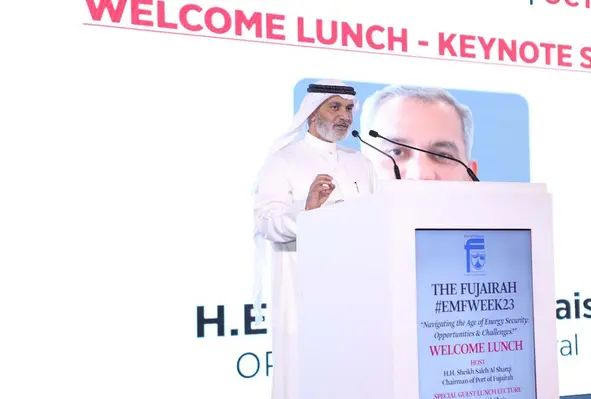Global oil demand will soar by 15% to 116mn barrels per day over the next two decades, which is 6mn barrels a day more than OPEC had forecast only 12 months ago, the secretary general of the Organisation of Petroleum Exporting Countries told the Energy Markets Forum in Fujairah
Global primary energy demand is set to increase from around 291 mn barrels of oil equivalent per day (mboe/d) in 2022 to close to 359 mboe/d in 2045, an increase of 68.3 mboe/d, or 23% over the outlook period, OPEC reported in its latest World Oil Outlook 2023. Growth is expected to slow gradually from the relatively high short-term rates to more modest long-term increments, in line with moderating population and economic growth.
“Recent developments have led the OPEC team to reassess just what each energy can deliver, with a focus on pragmatic and realistic options and solutions,” Haitham Al Ghais, the OPEC Secretary General, said in an onstage interview at the 11th Energy Markets Forum today in Fujairah. “For this to be achieved, oil sector investment requirements out to 2045 total US$14 trillion, or around US$610bn on average per year -- It is vital that these are made as it is beneficial for both producers and consumers,” he said.
Annual upstream oil and gas investment rose by 39% in 2022 from the previous year to US$499bn, the highest level since 2014, but drilling remained below pre-pandemic levels as inflation ate away at the spending. The number of drilling rigs rose by 22% in 2022, but this was still 10% below 2019 levels. The recovery in 2022 marked a change from the previous two years, when capital expenditure slumped with the COVID-19 pandemic contributing to a tightening of global energy markets, price spikes and shortages of natural gas.
The 11th edition of the Energy Markets Forum was held under the patronage of Sheikh Hamad bin Mohammed Al Sharqi, Supreme Council Member and Ruler of Fujairah, in the presence of Sheikh Mohammed bin Hamad bin Mohammed Al Sharqi, Crown Prince of Fujairah, and Sheikh Saleh bin Mohammed bin Hamad Al Sharqi, chairman of Fujairah Port Authority, in Fujairah from 10-11 October in Novotel Hotel.
“Governments and political parties are reevaluating their sustainable energy pathways, taking into account the realities on the ground and the views of populations. There has been pushback against the opinion that the world should see the back of fossil fuels, as policies and targets for other energies falter due to costs and a more nuanced understanding of the scale of the energy challenges,” OPEC’s Al-Ghais said in his forum feature interview. “Moreover, we are now seeing more focus on the capacities and national circumstances of all countries in the energy transitions agenda, not just a select few,” he said.
The two-day annual gathering theme this year was focused on exploring what impact energy security policies will have on the international energy markets from the Middle East to Asia in 2024 as countries prioritise access to secure energy supplies, while at the same time embracing the energy transition. The 300 delegates were in attendance from across the world, and had 20 sessions to choose from, as well as the opportunity to go on industry tours to the Port of Fujairah, and the onshore storage terminals.







